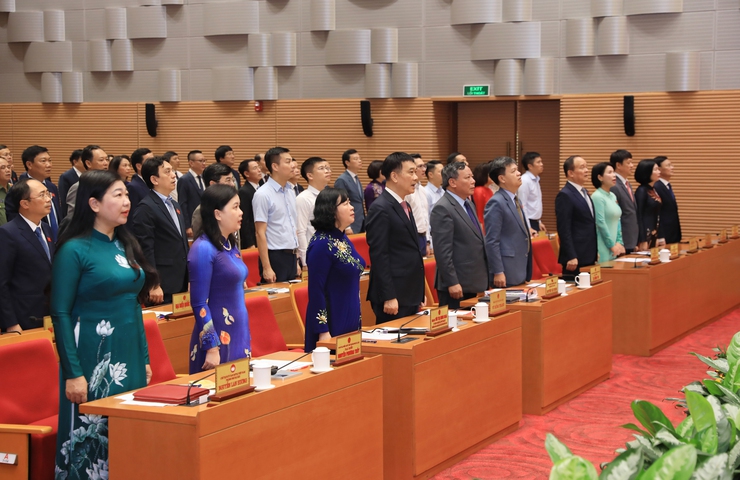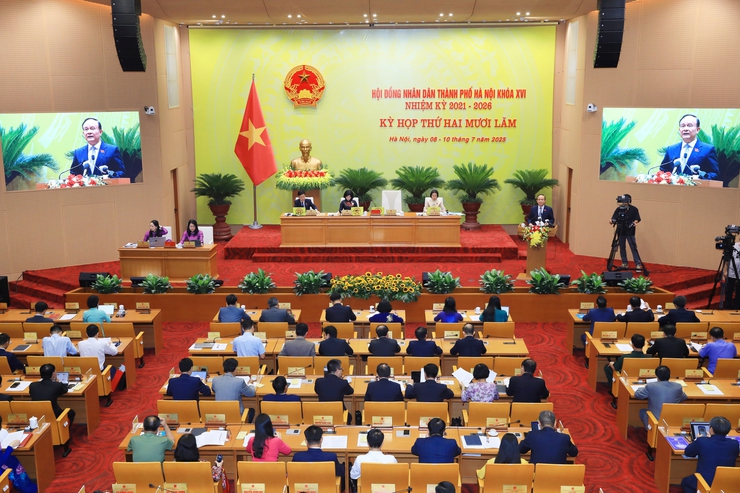In attendance were leaders from the central government, including Vu Hong Thanh, Member of the Party Central Committee and Vice Chairman of the National Assembly, along with representatives from various committees under the National Assembly.

Delegates at the session.
From Hanoi, the participants included several senior leaders: Bui Thi Minh Hoai, Member of the Politburo, Secretary of the Hanoi Party Committee, and Head of the city's National Assembly Delegation; Nguyen Van Phong, Permanent Deputy Secretary of the Party Committee; Nguyen Ngoc Tuan, Deputy Secretary of the Party Committee and Chairman of the Hanoi People's Council; and Nguyen Lan Huong, Member of the Standing Committee of the Party Committee and Chairwoman of the Vietnam Fatherland Front Committee of Hanoi.
Also in attendance were key representatives from the Hanoi People's Council, the People's Committee, and the National Assembly delegation.
In his opening remarks, Chairman of the Hanoi People's Council Nguyen Ngoc Tuan emphasized that this 25th session is a regular mid-year meeting to assess the city's socio-economic development, national defense and security, and budget revenues and expenditures during the first six months of 2025, and to define key tasks and solutions for the rest of the year. The session also addresses several important issues under the Council's authority.
This meeting takes place immediately after Hanoi and the entire country completed the organizational restructuring under the new two-tier local government model. In accordance with the coordination mechanism among the National Assembly Delegation, the Standing Committee of the People's Council, the People's Committee, and the Vietnam Fatherland Front Committee of Hanoi, the Standing Committee of the People's Council worked with relevant agencies to review, align, and assign responsibilities for the meeting's agenda.
The approved agenda spans two and a half days, covering 16 reports and the adoption of 21 resolutions, grouped into three key areas:
First, the People's Council will evaluate the implementation of the socio-economic and political mission plan for the first half of 2025.
The year 2025 is of historic importance, marking a decisive turning point as Hanoi and the nation prepare to enter a new era of development, guided by strategic, comprehensive decisions—most notably, the restructuring of the government apparatus and the implementation of a two-tier local governance model.
With strict adherence to guidance from the central government, the Hanoi Party Committee, the People's Council, the People's Committee, and the Vietnam Fatherland Front Committee of Hanoi, all levels of the political system and the people of the capital worked with urgency, precision, and responsibility to restructure the city's political and administrative system. This process was carried out thoroughly and was completed on time with high quality.
At the 21st session of the People's Council in February 2025, Hanoi finalized the consolidation and merger of various departments and specialized agencies, creating a leaner and more efficient administrative system. On April 29, 2025, the Council adopted a proposal to restructure commune-level administrative units, which was submitted to the Government and the National Assembly Standing Committee. As a result, the number of communes, wards, and townships was reduced from 526 to 126—an unprecedented 76 percent decrease, the highest in the country.
Simultaneously, the city swiftly and thoroughly prepared for the implementation of the new two-tier local government model starting on July 1, 2025. Throughout the process, Hanoi closely followed instructions from the Politburo, the Secretariat, the Government, the National Assembly Standing Committee, and other central agencies—particularly with regard to the draft constitutional amendment resolution and the revised Law on Organization of Local Government. The city proposed additions to align these documents with the realities of Hanoi's urban governance model.
Hanoi proactively developed implementation plans, assigned responsibilities, nominated leadership personnel at the commune and ward levels, issued detailed instructions, and ensured full readiness for launching the new local governments. At 8:00 a.m. on July 1, 2025, all 126 restructured communes and wards successfully held their first sessions as planned, following guidance from the National Assembly Standing Committee and the directives of the Hanoi Party Committee, ensuring seamless and effective operations with no disruption to services for residents or businesses.
In parallel with institutional reform, the city has focused on economic growth and social welfare. In the first half of 2025, Hanoi's Gross Regional Domestic Product (GRDP) grew by 7.69 percent. Budget revenue reached approximately VND 92.71 trillion (equivalent to about US$15.4 billion), achieving 76.5 percent of the annual estimate and rising 51.4 percent year-on-year. Foreign direct investment inflows totaled nearly US$3.7 billion, more than double the figure for the same period in 2024. Political security and social order have been maintained, and urban, rural, cultural, and social development have been ensured.
Second, the People's Council will review specialized resolutions to implement the newly enacted Capital Law.

Overview of the session.
Following the law's entry into force, the Standing Committee of the People's Council and the People's Committee developed an action plan to concretize its provisions. So far, 28 resolutions have been adopted at regular and special sessions.
At this meeting, the Council is set to consider nine additional resolutions, covering strategic investment attraction, the establishment of cultural industrial centers and cultural-commercial development zones, the management and use of agricultural land in riverbank and dyke areas, measures to reduce plastic waste, and policies to support the payment of social and health insurance premiums for policy beneficiaries.
These are new and practical policies intended to bring the Capital Law into effect. Delegates are encouraged to study, discuss, and contribute actively to ensure that the policies passed are practical and contribute meaningfully to Hanoi's growth and transformation.
Third, the Council will consider resolutions related to finance, budgeting, business support, and social welfare.
These include policies supporting agricultural recovery in areas affected by natural disasters and disease, support packages for small and medium-sized enterprises in the city, land rental exemption policies for investment-priority projects, and mechanisms to support daily meals for primary school students.
In preparation for this session, the Standing Committee of the People's Council directed its various committees to coordinate with relevant agencies and follow a thorough verification process to ensure that the review of documents is systematic, efficient, and compliant with regulations.
The Vietnam Fatherland Front Committee of Hanoi also organized public consultations and social feedback sessions on major topics with broad societal impact. These efforts provided a foundation for informed debate and effective decision-making by the People's Council.
Fourth, the session will dedicate half a day to interpellation and re-interpellation activities.
The Standing Committee of the People's Council has proposed two key topics: the first is a follow-up on the implementation of resolutions and commitments made at the twentieth session of the Council; the second concerns the enforcement of food safety regulations across the city.
"These are critical and highly relevant issues that the city is currently prioritizing. They are subjects of public concern and have been proposed by council members and committees," Chairman Nguyen Ngoc Tuan emphasized.